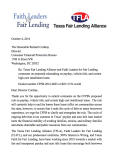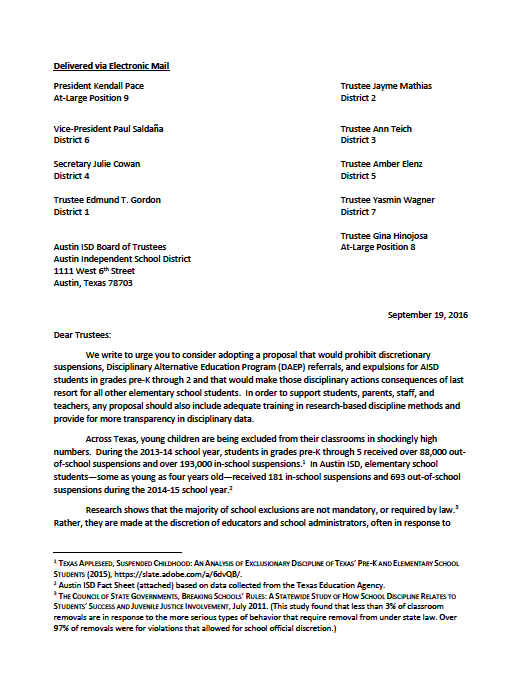Resources
These comments are from the Texas Fair Lending Alliance (TFLA) and Faith Leaders for Fair Lending — Texas Appleseed is a member of TFLA. Background: Comments on proposed rulemaking on payday, vehicle title, and certain high-cost installment loans. There are three attachments after the comments: 1) Borrower Stories Submitted to TFLA 2) City & County Ordinances/Resolutions 3) Additional Borrower Stories. Docket Number CFPB-2016-0025 or RIN 3170-AA40. Opening Paragraph: Dear Director Cordray, Thank you for the opportunity to submit comments on the CFPB's proposed rule on payday, vehicle title, and certain high cost installment loans. The rule will certainly help to end the harms these loans inflict on communities across the state; however, to ensure that it ends the cycle of debt so many borrowers experience, we urge the CFPB to clarify and strengthen the rule. The cycle of ongoing debt that is too common in Texas’ payday and auto title loan market hurts the financial stability of working families, seniors, and military families and drains charitable and public resources from our communities.
Letter to Austin ISD (AISD) School Board Trustees Regarding Discretionary Classroom Removals of Young Students
September 19, 2016
A letter from Texas advocates calling for an end to discretionary classroom removals for young students. Key words: suspensions, expulsions, Disciplinary Alternative Education Program (DAEP) referrals
Fact Sheet: School Discipline Trends Among Austin ISD Elementary Students
September 19, 2016
Fact Sheet with data about Austin ISD (AISD) elementary school removals
Statement: New Federal Disaster Guidance Designed to Protect Civil Rights of Communities of Color
August 24, 2016
Texas Appleseed joins six other organizations — the Fair Share Housing Center, the Greater New Orleans Fair Housing Action Center, the Lawyers’ Committee for Civil Rights Under the Law, the Mississippi Center for Justice, the National Fair Housing Alliance, and Texas Low Income Housing Information Service — in welcoming new federal guidance from the U.S. Department of Justice aimed at protecting civil rights during the response to and recovery from major disasters. Key words: disaster planning; disaster response; disaster recovery; Hurricane Katrina; Hurricane Ike; Superstorm Sandy.
In the consumer lending industry in Texas, almost all contracts for payday and auto title loans have an arbitration agreement that borrowers are required to sign to apply for a loan. Most contracts also include a ban on class actions; some include other provisions such as limits on available damages or waivers to jury trials. Given the flaws inherent to the arbitration system outlined in this comment and the ability of class action lawsuits to remedy harms and incentivize better practices, Texas Appleseed supports ensuring class action lawsuits are available to consumers by preventing companies from banning them through pre-dispute arbitration agreements. See comment for more >>
Pages
Criminal Discovery
Immigrant Children & Families
Mental Health
Bail Reform & Pretrial Justice
Civil Asset Forfeiture
Coerced Debt
Criminal Justice
Debt Collection
Disaster Recovery & Fair Housing
Education Justice
Fair Financial Services
Fines & Fees
Foster Care & Courts
Homeless Youth
Insurance
Juvenile Justice
Other Issues
Payday & Auto Title Lending Reform
Protecting Seniors from Financial Abuse















